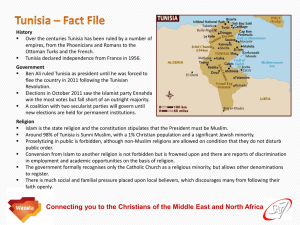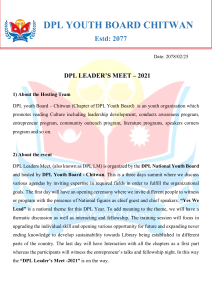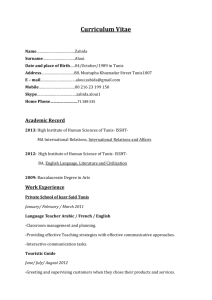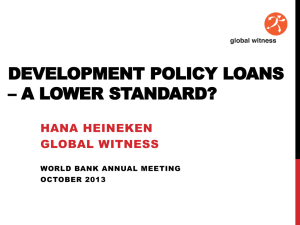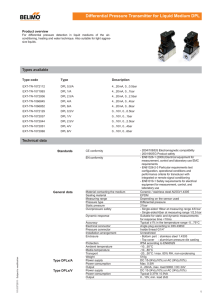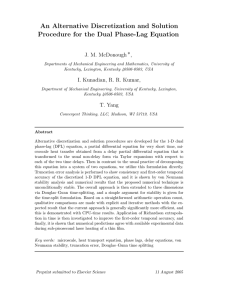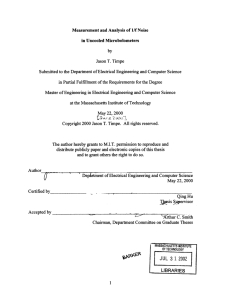Program Information Document - Documents & Reports
advertisement
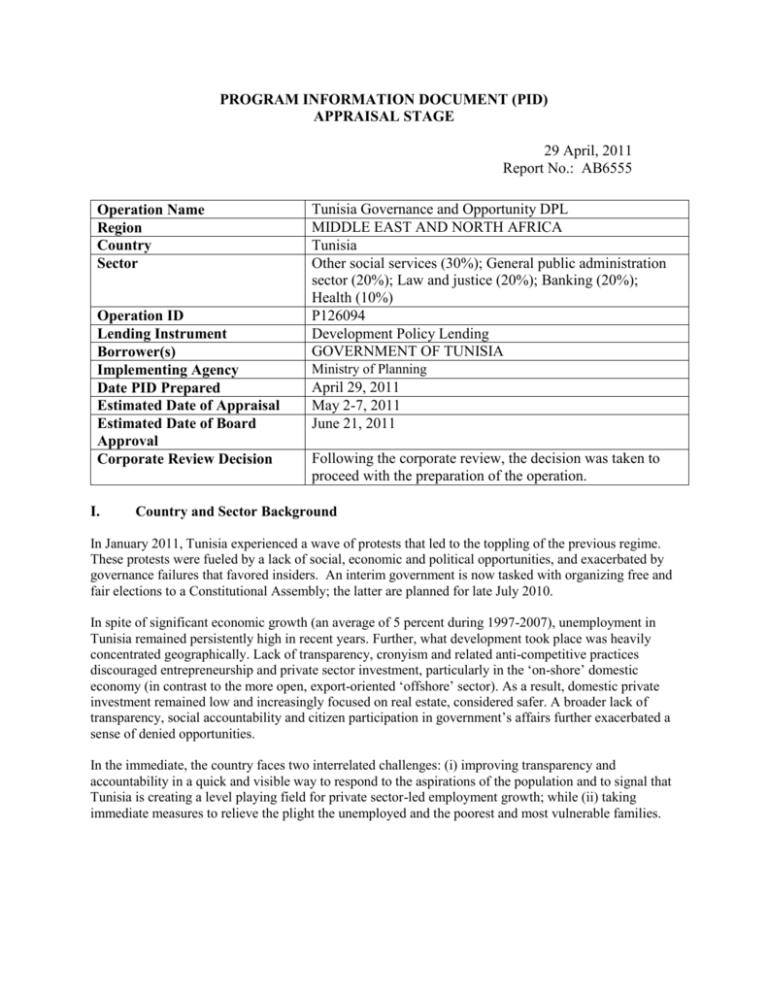
PROGRAM INFORMATION DOCUMENT (PID) APPRAISAL STAGE 29 April, 2011 Report No.: AB6555 Operation Name Region Country Sector Operation ID Lending Instrument Borrower(s) Implementing Agency Date PID Prepared Estimated Date of Appraisal Estimated Date of Board Approval Corporate Review Decision I. Tunisia Governance and Opportunity DPL MIDDLE EAST AND NORTH AFRICA Tunisia Other social services (30%); General public administration sector (20%); Law and justice (20%); Banking (20%); Health (10%) P126094 Development Policy Lending GOVERNMENT OF TUNISIA Ministry of Planning April 29, 2011 May 2-7, 2011 June 21, 2011 Following the corporate review, the decision was taken to proceed with the preparation of the operation. Country and Sector Background In January 2011, Tunisia experienced a wave of protests that led to the toppling of the previous regime. These protests were fueled by a lack of social, economic and political opportunities, and exacerbated by governance failures that favored insiders. An interim government is now tasked with organizing free and fair elections to a Constitutional Assembly; the latter are planned for late July 2010. In spite of significant economic growth (an average of 5 percent during 1997-2007), unemployment in Tunisia remained persistently high in recent years. Further, what development took place was heavily concentrated geographically. Lack of transparency, cronyism and related anti-competitive practices discouraged entrepreneurship and private sector investment, particularly in the ‘on-shore’ domestic economy (in contrast to the more open, export-oriented ‘offshore’ sector). As a result, domestic private investment remained low and increasingly focused on real estate, considered safer. A broader lack of transparency, social accountability and citizen participation in government’s affairs further exacerbated a sense of denied opportunities. In the immediate, the country faces two interrelated challenges: (i) improving transparency and accountability in a quick and visible way to respond to the aspirations of the population and to signal that Tunisia is creating a level playing field for private sector-led employment growth; while (ii) taking immediate measures to relieve the plight the unemployed and the poorest and most vulnerable families. II. Operation Objectives To secure the transition, the operation would support a program of immediate measures that are emblematic of improved governance and opportunity and are within the mandate of the interim government to undertake. The Development Policy Lending supports a set of core measures envisaged by the interim government in the areas of governance, financial sector, employment, and social policies. The measures focus on: (i) improving transparency and accountability in a quick and visible way to respond to the aspirations of the population and to signal that Tunisia is creating a level playing field for private sector-led employment growth; while (ii) taking immediate actions to relieve the plight the unemployed and the poorest and most vulnerable families The proposed Governance and Opportunity DPL is a single-tranche policy-based loan. The latter is focusing on four key areas: Governance: The immediate agenda involves: (i) strengthening the legal framework for association to boost civil society participation; (ii) removing the constraints that prevent public access to statistics, hence creating scope for independent analysis; (iii) improving public procurement procedures to accelerate decision-making while reducing discretion; and (iv) purging the administrative and regulatory environment faced by citizens and firms from cronyism and arbitrariness. Employment and regional development. The immediate agenda is to prioritize a few complementary measures that can be introduced in the short-term to stimulate private labor demand while supporting the unemployed (unemployment rate was at 13 percent in 2010 and likely to increase). Possible measures could include: (i) establishing a new regulatory framework for the National Employment Fund; (ii) introducing a comprehensive program to enhance the employability of the high-skilled youth; (iv) introducing a new program to assist low-skilled long-term unemployed through a cash-for-training program and/or enhanced public works. Financial Sector: In order to allow the financial system to play its expected role in the job creation process the immediate agenda is (i) to mend bank corporate governance; (ii) preserve bank stability, in the light of a legacy of poorer practices; and (ii) create a framework for microfinance and other institutions to develop and support the creation of small and\or innovative firms. Social policies: To address the concerns of the citizenry, there is a consensus on the importance of promoting access to quality public services and accountability particularly in underserved regions. The immediate objectives are: (i) to develop citizen voice mechanisms in the evaluation and planning of key public service delivery; and (ii) to create a national outreach services policy to expand effective access to health care in underserved governorates. The proposed Governance and Opportunity DPL would support key measures within that agenda. It is part of a package of support being prepared jointly by the World Bank, the African Development Bank (AfDB), and the European Union (EU) and the French Development Agency (AFD) and with the participation as observers of the Japanese Development Agency (JICA). Preparatory missions have been held jointly. III. Rationale for Bank Involvement During this interim period, the main focus of the Bank is to help the country meet its aspirations for improved governance and opportunity, and thereby set itself on course towards a faster growth rate and expanding job opportunities. IV. Tentative Financing Source: Borrower International Bank for Reconstruction and Development Borrower/Recipient IBRD ($m.) 0 500 Total V. 500 Institutional and Implementation Arrangements Implementation and coordination responsibilities: The responsibility for implementing the program in government rests with the Ministry of Planning and International Cooperation which will coordinate all relevant activities with other Ministries. The government will take the lead in monitoring progress in implementation of this operation. Supervision by the Bank: Regular supervision will allow the World Bank to continue providing policy advice and technical assistance to the institutions involved in the implementation of the program of reform. The Bank will continue to maintain continuous dialogue with the relevant government ministries and will conduct regular reviews in close collaboration with other partners. This will take the form of joint missions with the AfDB, ADF and the EU and shared analytical underpinnings. Monitoring and Evaluation: The monitoring and evaluation of the program and its expected results will be based on the government regular M&E activities. The World Bank and other development partners will focus on monitoring progress towards the expected results of the program. In this regard, the World Bank has agreed with the counterparts on clear indicators and targets that are expected to be reached with respect to the initial baseline that will be monitored during the implementation of the program and after its completion. The expected results are presented in the Policy and Institutional matrix in the Project Document of this operation. The World Bank and other development partners will continue to provide support to the government to strengthen M&E, improve data quality and management and enhance capacity for using development outcomes to inform policy making VI. Risks and Risk Mitigation (i) Risks related to renewed political instability from unmet or conflicting political aspirations: To mitigate this risk, the government is building consensus through consultation (including though the broadening of membership of the High Committee for political reforms). A benevolent international framework, including financial and political support from the international community will also help mitigate these political risks. (ii) Risks related to the uncertainty of the economic, hence social outlook. To mitigate these risks the authorities have adopted a strong plan to scale up social interventions, support enterprises during this transition, and accelerate public investments. The resources from this operation are intended to help finance this plan and mitigate these risks. The measures supported by this operation also aim to both facilitate public investments (though simplification of procurement procedures), and improve the provision of social services, and to help reestablish social stability by addressing the key demands for voice and accountability made by the population. (iii) Risks related to the design and implementation of the program: The Bank’s technical assistance and informal discussions with civil society and key stakeholders during the preparation of the DPL should mitigate these risks, even if the operation’s time frame remains a major constraint. For this reason, the program is focused on reforms that are not politically colored, but rather focus on the efficiency and transparency in the operation of the administration. Further, the program focuses on limited amendments based on consensus and which explicitly address social aspirations. VII. Poverty and Social Impacts and Environment Aspects Poverty and Social Impacts The poverty and social impacts of the policies supported by this DPL operation are expected to be positive. The poverty reduction impact of the policies supported by the DPL, namely enhancing governance (including in the financial sector and public services) and assistance to the unemployed, and expanding frontline service delivery, are expected to have positive social and poverty impacts. In addition, improvement in the public procurement process is expected to help Tunisia recover in the aftermath of the global economic crisis. The regulatory simplification is expected to improve the business environment and increasing growth and employment in the medium term. Faster growth would lead to increased job creation, thereby supporting household incomes, with a positive impact on reducing poverty. The specific policies supported by this DPL are not expected to have negative distributional and social impacts, except possibly positive ones arising from the increased voice in the management of public life and the delivery of public services, and improved access to employment and social services. Environment Aspects The reforms supported in this DPL operation are not expected to have significant positive or negative effects on the environment, forest and other natural resources. The DPL supports policy actions that create the enabling environment to support job creation, employment and poverty reduction, and which by themselves do not have an environmental impact. It is expected, however, that regular private and public investment activities which may result from such policy actions, could have impacts on the environment. Nevertheless it is not expected that there will be need to introduce special measures since all activities to be carried out are subject to the Tunisian legal framework for the protection of the environment. Thus, neither specific environmental studies nor environmental impact management measures are anticipated. VIII. Contact Points World Bank Contact: Antonio Nucifora Title: Senior Economist Tel: +216 71103696 Email: anucifora@worldbank.org Contact: Daniela Marotta Title: Economist Tel: +1 202 4733777 Email: dmarotta@worldbank.org Location: Tunis, Tunisia (IBRD) Location: Washington, D.C., USA (IBRD) Borrower Contact: Mr Abdallah Zekri Title: Director of Multilateral Cooperation, Ministry of Planning and International Cooperation Tel: +216 71798522 Email: A.Zekri@mdci.gov.tn For more information contact: The InfoShop The World Bank 1818 H Street, NW Washington, D.C. 20433 Telephone: (202) 458-4500 Fax: (202) 522-1500 Web: http://www.worldbank.org/infoshop
